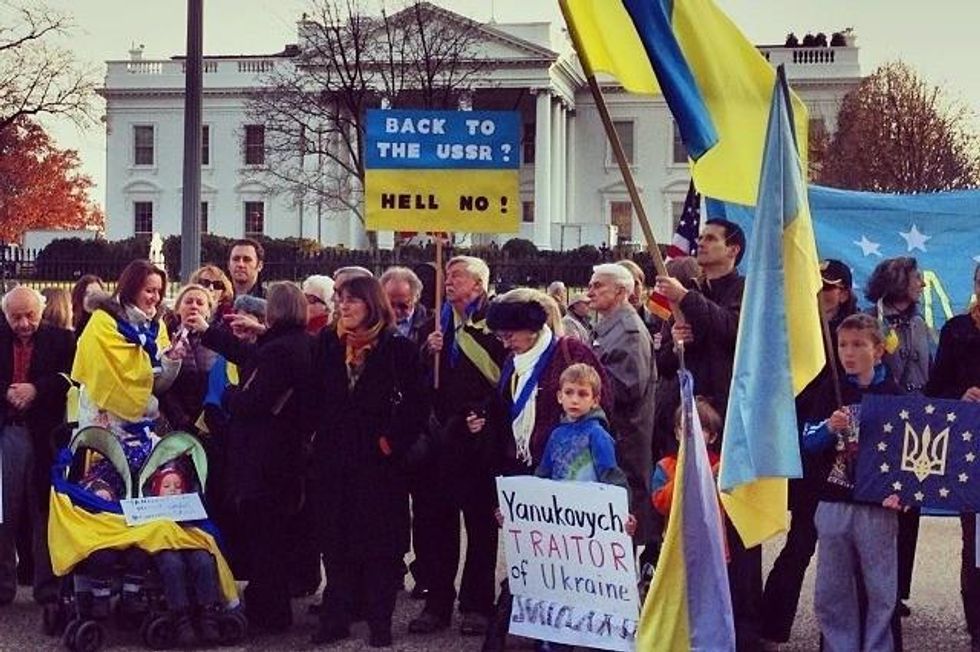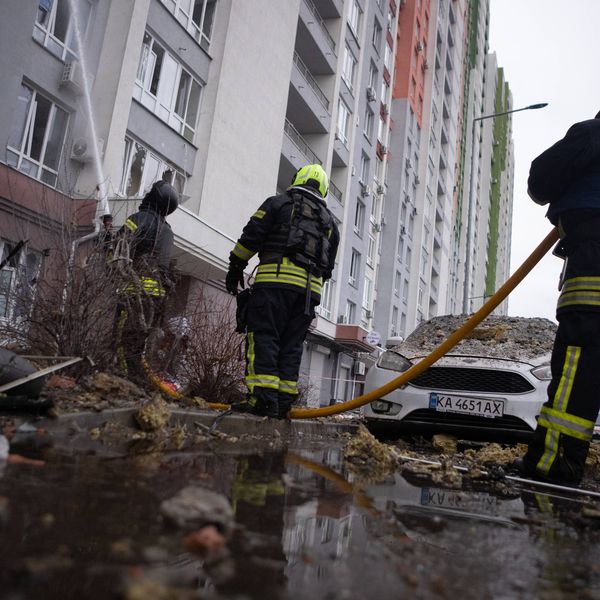Ukraine: Tensions Mount Ahead of Crimea Referendum Vote
US says they will not recognize results of secession vote, threatens more Russian sanctions

U.S. ambassador in Kiev Geoffrey Pyatt said the U.S. will not recognize next Sunday's referendum in Crimea, warning that stronger sanctions against Russia would follow if it proceeds.
Meanwhile pro-Russian forces wearing military uniforms were on the move again, taking control of a military airport in Crimea near the village of Saki, a Ukrainian Defense Ministry spokesman on the peninsula said.
And pro-Russian forces took over a Ukrainian border post on the western edge of Crimea at 6 a.m. (0400) GMT, Oleh Slobodyan a border guard spokesman told Reuters. Russian forces now control 11 border guard posts across Crimea, according to Slobodyan.
Ukrainian troops, whose numbers are far outweighed by Russian forces, began training exercises in their bases, but Defense Minister Ihor Tenyukh said there are no plans to send them into Crimea.
On Sunday, David Cameron and Angela Merkel warned that any attempt by Russia to further legitimize Sunday's referendum would result in stronger sanctions.
On Monday, the Russian Foreign Ministry rebutted, condemning the "lawlessness" of pro-EU actors in eastern Ukraine over what he said was violence and detentions taking place against Russian citizens.
Tens of thousands of protesters took part in rival pro-Ukraine and pro-Russian rallies in Ukraine on Sunday, with occasional clashes occurring throughout the day.
Speaking at a rally in Kiev, newly installed Ukraine Prime Minister Yatsenyuk used strong language denouncing Russia's actions in Crimea, saying they will not give a "single centimeter" of Ukrainian land to Russia.
Speaking with Democracy Now! on Monday, journalist on the ground in Crimea Nicholas Clayton said the referendum leaves "basically no possibility for Crimea to remain a part of Ukraine."
Clayton states:
The two questions on the referendum are, one, "Do you support Crimea becoming a part of the Russian Federation?" and two, "Do support the restoration of the 1992 Crimean constitution?" And the last form of that constitution, which was later abandoned after negotiations with Kiev, but in that last--in its last form, it described Crimea as an independent country, and so, therefore, if that constitution were to be restored, it's likely that the Crimean government would interpret that as meaning that Crimea would then be an independent country, one that might then later be absorbed by Russia, or it could become a--some sort of semi-independent protectorate, similar to what has occurred with Georgia's breakaway territories, Abkhazia and South Ossetia, that continue on recognized as independent by Russia and only a few of Russia's allies, but are basically dependent upon Russian aid and support.
On Twitter:
Tweets from https://twitter.com/commondreams/on-ukraine
_________________________________
An Urgent Message From Our Co-Founder
Dear Common Dreams reader, The U.S. is on a fast track to authoritarianism like nothing I've ever seen. Meanwhile, corporate news outlets are utterly capitulating to Trump, twisting their coverage to avoid drawing his ire while lining up to stuff cash in his pockets. That's why I believe that Common Dreams is doing the best and most consequential reporting that we've ever done. Our small but mighty team is a progressive reporting powerhouse, covering the news every day that the corporate media never will. Our mission has always been simple: To inform. To inspire. And to ignite change for the common good. Now here's the key piece that I want all our readers to understand: None of this would be possible without your financial support. That's not just some fundraising cliche. It's the absolute and literal truth. We don't accept corporate advertising and never will. We don't have a paywall because we don't think people should be blocked from critical news based on their ability to pay. Everything we do is funded by the donations of readers like you. Will you donate now to help power the nonprofit, independent reporting of Common Dreams? Thank you for being a vital member of our community. Together, we can keep independent journalism alive when it’s needed most. - Craig Brown, Co-founder |
Jacob Chamberlain is a former staff writer for Common Dreams. He is the author of Migrant Justice in the Age of Removal. His website is www.jacobpchamberlain.com.

U.S. ambassador in Kiev Geoffrey Pyatt said the U.S. will not recognize next Sunday's referendum in Crimea, warning that stronger sanctions against Russia would follow if it proceeds.
Meanwhile pro-Russian forces wearing military uniforms were on the move again, taking control of a military airport in Crimea near the village of Saki, a Ukrainian Defense Ministry spokesman on the peninsula said.
And pro-Russian forces took over a Ukrainian border post on the western edge of Crimea at 6 a.m. (0400) GMT, Oleh Slobodyan a border guard spokesman told Reuters. Russian forces now control 11 border guard posts across Crimea, according to Slobodyan.
Ukrainian troops, whose numbers are far outweighed by Russian forces, began training exercises in their bases, but Defense Minister Ihor Tenyukh said there are no plans to send them into Crimea.
On Sunday, David Cameron and Angela Merkel warned that any attempt by Russia to further legitimize Sunday's referendum would result in stronger sanctions.
On Monday, the Russian Foreign Ministry rebutted, condemning the "lawlessness" of pro-EU actors in eastern Ukraine over what he said was violence and detentions taking place against Russian citizens.
Tens of thousands of protesters took part in rival pro-Ukraine and pro-Russian rallies in Ukraine on Sunday, with occasional clashes occurring throughout the day.
Speaking at a rally in Kiev, newly installed Ukraine Prime Minister Yatsenyuk used strong language denouncing Russia's actions in Crimea, saying they will not give a "single centimeter" of Ukrainian land to Russia.
Speaking with Democracy Now! on Monday, journalist on the ground in Crimea Nicholas Clayton said the referendum leaves "basically no possibility for Crimea to remain a part of Ukraine."
Clayton states:
The two questions on the referendum are, one, "Do you support Crimea becoming a part of the Russian Federation?" and two, "Do support the restoration of the 1992 Crimean constitution?" And the last form of that constitution, which was later abandoned after negotiations with Kiev, but in that last--in its last form, it described Crimea as an independent country, and so, therefore, if that constitution were to be restored, it's likely that the Crimean government would interpret that as meaning that Crimea would then be an independent country, one that might then later be absorbed by Russia, or it could become a--some sort of semi-independent protectorate, similar to what has occurred with Georgia's breakaway territories, Abkhazia and South Ossetia, that continue on recognized as independent by Russia and only a few of Russia's allies, but are basically dependent upon Russian aid and support.
On Twitter:
Tweets from https://twitter.com/commondreams/on-ukraine
_________________________________
Jacob Chamberlain is a former staff writer for Common Dreams. He is the author of Migrant Justice in the Age of Removal. His website is www.jacobpchamberlain.com.

U.S. ambassador in Kiev Geoffrey Pyatt said the U.S. will not recognize next Sunday's referendum in Crimea, warning that stronger sanctions against Russia would follow if it proceeds.
Meanwhile pro-Russian forces wearing military uniforms were on the move again, taking control of a military airport in Crimea near the village of Saki, a Ukrainian Defense Ministry spokesman on the peninsula said.
And pro-Russian forces took over a Ukrainian border post on the western edge of Crimea at 6 a.m. (0400) GMT, Oleh Slobodyan a border guard spokesman told Reuters. Russian forces now control 11 border guard posts across Crimea, according to Slobodyan.
Ukrainian troops, whose numbers are far outweighed by Russian forces, began training exercises in their bases, but Defense Minister Ihor Tenyukh said there are no plans to send them into Crimea.
On Sunday, David Cameron and Angela Merkel warned that any attempt by Russia to further legitimize Sunday's referendum would result in stronger sanctions.
On Monday, the Russian Foreign Ministry rebutted, condemning the "lawlessness" of pro-EU actors in eastern Ukraine over what he said was violence and detentions taking place against Russian citizens.
Tens of thousands of protesters took part in rival pro-Ukraine and pro-Russian rallies in Ukraine on Sunday, with occasional clashes occurring throughout the day.
Speaking at a rally in Kiev, newly installed Ukraine Prime Minister Yatsenyuk used strong language denouncing Russia's actions in Crimea, saying they will not give a "single centimeter" of Ukrainian land to Russia.
Speaking with Democracy Now! on Monday, journalist on the ground in Crimea Nicholas Clayton said the referendum leaves "basically no possibility for Crimea to remain a part of Ukraine."
Clayton states:
The two questions on the referendum are, one, "Do you support Crimea becoming a part of the Russian Federation?" and two, "Do support the restoration of the 1992 Crimean constitution?" And the last form of that constitution, which was later abandoned after negotiations with Kiev, but in that last--in its last form, it described Crimea as an independent country, and so, therefore, if that constitution were to be restored, it's likely that the Crimean government would interpret that as meaning that Crimea would then be an independent country, one that might then later be absorbed by Russia, or it could become a--some sort of semi-independent protectorate, similar to what has occurred with Georgia's breakaway territories, Abkhazia and South Ossetia, that continue on recognized as independent by Russia and only a few of Russia's allies, but are basically dependent upon Russian aid and support.
On Twitter:
Tweets from https://twitter.com/commondreams/on-ukraine
_________________________________

